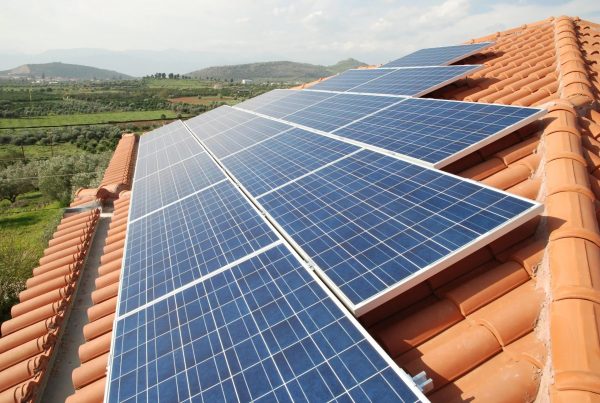
Greece occupies the tenth place in the list of the top 10 countries in the world in terms of photovoltaic power per inhabitant. Based on 2022 data, first is Australia with 1,191 watts per inhabitant, second is the Netherlands with 1,029 watts per inhabitant, third is Germany with 815 watts per inhabitant, followed by Denmark (713 watts per inhabitant), Japan (677 watts per capita), Belgium (667 watts per capita), Estonia (601 watts per capita), Spain (572 watts per capita), Switzerland (535 watts per capita) and Greece (531 watts per capita).
This is according to the latest edition of SolarPower Europe’s Global Market Outlook 2023-2027, which was presented during Intersolar Europe taking place these days in Munich, Germany. Especially, for rooftop photovoltaics, six countries including Greece (Denmark, India, Austria, China, Greece and South Africa) showed growth rates exceeding 50% last year.
Globally rooftop solar increased from 79 GW (gigawatts) in 2021 to 118 GW in 2022. For 2023 SolarPower Europe predicts growth of 35% with an expected addition of 159 GW while for 2024 the number may rise to 183 GW and potentially reaching 268 GW by 2027 (under the medium scenario).
Record year in 2022
In total, 239 GW of new solar parks of all sizes were installed worldwide in 2022, equivalent to an annual growth rate of 45% (highest since 2016). In fact, 49.5% of the new capacity was rooftop photovoltaics. In Brazil, Italy and Spain installed capacity increased by 193%, 127% and 105%, respectively.
Overall, last year was another record year for solar power, led once again by China, which added nearly 100 GW in just one year, a growth rate of 72%. The United States retained second place with 21.9 GW, followed by India with 17.4 GW and Brazil with 10.9 GW. Spain was the largest PV market in Europe with 8.4 GW.
In addition to the top five countries, another 21 countries added more than 1 GW of solar power each by 2022. Rounding out the top ten are Germany, Japan, Poland, the Netherlands and Australia, followed by South Korea, Italy, France, Taiwan, Chile, Denmark, Turkey, Greece, South Africa, Austria, United Kingdom, Mexico, Hungary, Pakistan, Israel and Switzerland.
Forecasts for the coming years
According to SolarPower in 2023 341 GW to 402 GW of solar power is expected to be installed worldwide, in 2027 it may reach 800 GW while by 2030 it is estimated that around 1 TW of solar power may be installed annually. At the end of 2022 the total installed solar capacity, across the planet, reached almost 1.2 TW (terawatts).
For this year, countries expected to contribute to the further development of solar energy projects include Poland, the Netherlands, France, Greece, Austria, Belgium, Hungary and Sweden. As for the period 2023-2027, Greece is in 17th place among the 20 countries that will contribute the most to the development of photovoltaics.
The Greek market
In 2022, 1,362 GW of new photovoltaic projects were connected to the grid, bringing the solar capacity in Greece to 5.5 GW. However, according to data provided by the policy advisor of the Association of Photovoltaic Companies (SEF), Mr. Stelios Psomas, the expected performance of the market in 2023 is expected to be even more impressive as new solar capacity of around 2 GW is estimated.
Once again, in 2022, the market was dominated by medium-sized projects between 10 kW and 1,000 kW. Also, solar energy accounted for 13.5% of electricity generation in 2022. The really good news, according to Mr. Psomas, comes from self-consumption. For the first time, installations in 2022 exceeded the 100 MW milestone (110.8 MW connected to the grid in 2022) and 2023 is expected to be another record year for self-consumption systems, with the market expected to triple.
In terms of support programs, approximately 4.1 GW of RES projects will be auctioned in Greece between 2023 and 2025, with photovoltaics expected to secure approximately 3 GW. In addition, as estimated, the corporate bilateral power purchase contracts (PPAs) will take off, while their support scheme (Green Pool) has been sent by the Ministry of Foreign Affairs to the Commission for approval.
Latest News

German Ambassador to Greece Talks Ukraine, Rise of Far Right & Tariffs at Delphi Economic Forum X
Commenting on the political developments in his country, the German Ambassador stressed that it was clear the rapid formation of a new government was imperative, as the expectations across Europe showed.

Athens to Return Confiscated License Plates Ahead of Easter Holiday
Cases involving court orders will also be excluded from this measure.

Servicers: How More Properties Could Enter the Greek Market
Buying or renting a home is out of reach for many in Greece. Servicers propose faster processes and incentives to boost property supply and ease the housing crisis.

Greek Easter 2025: Price Hikes on Lamb, Eggs & Sweets
According to the Greek Consumers’ Institute, hosting an Easter dinner for eight now costs approximately €361.95 — an increase of €11 compared to 2024.

FM Gerapetritis Calls for Unified EU Response to Global Crises at EU Council
"Europe is navigating through unprecedented crises — wars, humanitarian disasters, climate emergencies," he stated.

Holy Week Store Hours in Greece
Retail stores across Greece are now operating on extended holiday hours for Holy Week, following their Sunday opening on April 13. The move aims to accommodate consumers ahead of Easter, but merchants remain cautious amid sluggish market activity.

Green Getaway Ideas for Easter 2025 in Greece
Celebrate Easter 2025 in Greece the sustainable way with eco-farms, car-free islands, and family-friendly getaways rooted in nature and tradition.

Civil Protection Minister Details Summer Firefighting Plans at Delphi Forum
At the 10th Delphi Economic Forum, Minister of Climate Crisis and Civil Protection Yiannis Kefalogiannis discussed Greece's plans for the upcoming fire season.

How Shops and Markets Will Operate During Easter Holy Week
The Easter holiday schedule has been in effect since April 10, with retail stores open Palm Sunday, and most supermarkets also operating to meet consumer demand for Easter shopping

Why Is the French Aircraft Carrier Charles De Gaulle in Piraeus?
Docking in Piraeus after a four-month deployment in the Indo-Pacific region, the admiral of the aircraft carrier the Charles de Gaulle says, "Greece is our best partner in the Mediterranean."





























![F-35: Το ακριβό μαχητικό που διεκδικούν αρκετές χώρες [γράφημα]](https://www.ot.gr/wp-content/uploads/2025/03/f-35-1-600x400.jpg)










 Αριθμός Πιστοποίησης
Αριθμός Πιστοποίησης